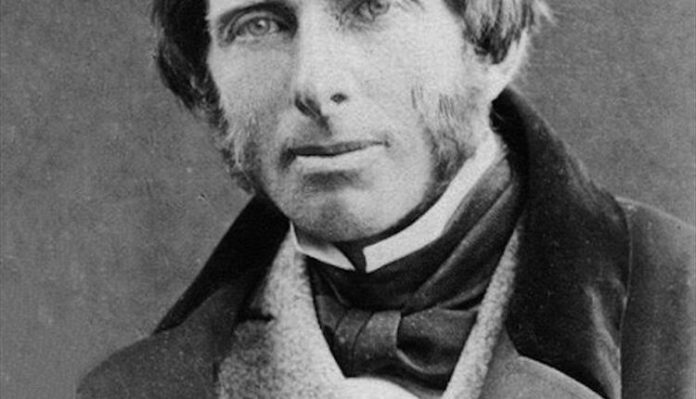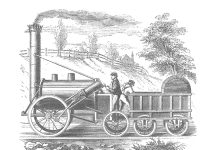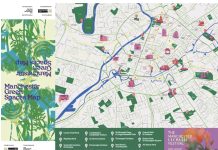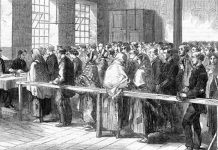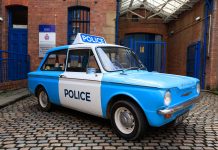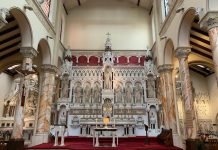An exhibition exploring the artist, writer, social reformer, philanthropist and ecologist John Ruskin’s (1819–1900) fascinating and complex connection to Manchester has opened at Manchester Metropolitan University Special Collections as part of the Ruskin in Manchester festival, marking his 200th birthday.
Ruskin’s Manchester: ‘Devils Darkness’ to Beacon City, (until Friday 23 August 2019), features key objects and artworks including books, drawings, paintings, studio pottery and textiles from Manchester Metropolitan University Special Collections and loans from Ruskin-related collections. Ruskin gave a lecture at Manchester School of Art in 1859, speaking about the importance of art education, whose collections are now part of Manchester Metropolitan University Special Collections.
The exhibition traces Ruskin’s relationship with Manchester, from the smog he described as ‘Devil’s Darkness’ to the city’s response to the alternative he presented, and the continuing relevance of his message to Manchester: of ‘the hand, the head, and the heart’ coming together. Pieces highlight early influences on his life, to how he went on to influence the city’s thinking, approach and even architecture.
In art Ruskin’s own observations of nature are presented besides those of today from 42nd Street, a young people’s arts organisation in Manchester. Quentin Blake has illustrated a new edition of Ruskin’s fairy tale for children for the bicentenary, The King of the Golden River (1841), which carries lessons about being kind and treasuring nature, with the exhibition featuring both the original book and illustrations from Quentin Blake. In his own time and since, the Ruskin brand has been marketable, with examples showing how this was used to represent the qualities he is associated with from the cottage industries of his Lake District home to 21st century brands such as Barbour, Billabong and John Lewis.
Ruskin’s Manchester: ‘Devils Darkness’ to Beacon City is curated by Dr Rachel Dickinson, a Principal Lecturer at Manchester Metropolitan University and Director of Education for Ruskin’s Guild of St George, who on Thursday 25 July will be giving a curators tour of the exhibition.
Dr Rachel Dickinson says, “Some of Ruskin’s most important lectures were held in Manchester, where he criticised the worst aspect of industralisation that he experienced in the city; the pollution, dirty industrial environment and poor living conditions. In contrast he promoted access to museums and art education for the working classes, which the city and civic leaders responded to and the legacy of which we can trace to the Manchester of today.”
Across the summer Ruskin’s remarkable story and legacy in Manchester will be explored by Ruskin in Manchester, a festival presenting a diverse and creative programme of events. The festival is funded and supported by Manchester Metropolitan University and Ruskin’s Guild of St George.
Manchester Cathedral, Elizabeth Gaskell’s House, The Portico, The Holden Gallery and many more Manchester cultural organisations are holding exhibitions and events that invite people to discover and experience the vast legacy of Ruskin and how the ideas he championed are as powerful and relevant now as they ever were. As a visionary thinker, expressions of Ruskin’s ideas can be seen in the creation of the National Trust, the concept of Green Belt, the creation of the Welfare State and National Health Service, and The Big Draw (originally the Guild of St George’s Campaign for Drawing).
The exhibition of national art competition The John Ruskin Prize 2019: Agent of Change, organised by The Big Draw, is being hosted by Manchester Metropolitan University’s Holden Gallery (from Friday 12 July until Saturday 24 August).
Elizabeth Gaskell’s House will be marking John Ruskin’s birthday with a programme of events supported by The National Lottery Heritage Fund that explore the relationship between these two mutual admirers and influencers of Victorian life, leading with the exhibition “My Dear Mr Ruskin…” Friendship, Inspiration and Scandal (Wednesday 17 July 2019 to Monday 1 June 2020). This exhibition takes the visitor on a journey from the studios of the Pre-Raphaelites and the Italian grand tour to legacies in education and social reform, to highlight the contributions of Ruskin and the Gaskell family.
Elizabeth Gaskell’s House will also be hosting a series of family friendly workshops each Wednesday of the school summer holidays (24 July to 28 August) that invite young makers to take part in an array of activities from cloud spotting and poetry writing to nature observations and sketching. On Friday 9 August urban sketcher Liz Ackerley will be hosting a sketch workshop that draws upon the inspiration of Ruskin.
For further information and the full programme of all Ruskin in Manchester events visit www.ruskinprize.co.uk/

